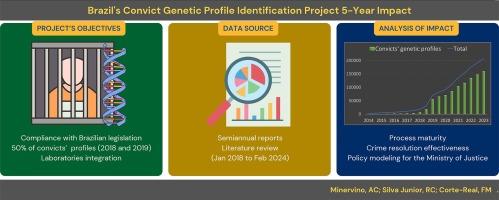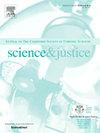Advancing justice: The impact of Brazil’s convict genetic profile identification project after 5 years
IF 1.9
4区 医学
Q2 MEDICINE, LEGAL
引用次数: 0
Abstract
This comprehensive study analyzed the implementation and impacts of the Convict Genetic Profile Identification Project in Brazil. By examining semiannual reports from the Integrated Network of DNA Databases (RIBPG) alongside a literature review covering the period from January 2018 to February 2024, the study evaluated the project’s relevance. The project’s primary aim was to enhance DNA databases, thereby fortifying crime prevention and resolution efforts. Notably, the results revealed a substantial increase in genetic profiles of convicted offenders included into the Brazilian National DNA Database (from 2,008 in 2017 to 54,657 in 2019) − a development that aligns with legislative goals. Despite legal and ethical debates, the project demonstrated a positive impact on criminal investigations, with a notable rise in database matches (from 376 in 2017 to 1,418 in 2019). Scientific literature had highlighted the project’s effectiveness in resolving crimes. The project has matured into a well-established process, characterized by continuous insertions and advancements, emphasizing a comprehensive operational framework. Beyond quantitative milestones, it has made qualitative contributions to justice. This collaborative model serves as an example for impactful public policies under Brazil’s Ministry of Justice and Public Security.

促进正义:巴西罪犯基因图谱鉴定项目 5 年后的影响
这项综合研究分析了巴西罪犯基因档案鉴定项目的实施情况和影响。通过研究 DNA 数据库综合网络(RIBPG)的半年度报告以及涵盖 2018 年 1 月至 2024 年 2 月期间的文献综述,本研究评估了该项目的相关性。该项目的主要目的是加强 DNA 数据库,从而加强犯罪预防和破案工作。值得注意的是,研究结果显示,巴西国家 DNA 数据库收录的已定罪罪犯基因图谱大幅增加(从 2017 年的 2 008 份增加到 2019 年的 54 657 份)--这一发展符合立法目标。尽管在法律和伦理方面存在争议,但该项目对刑事调查产生了积极影响,数据库匹配率显著上升(从 2017 年的 376 例增加到 2019 年的 1 418 例)。科学文献强调了该项目的破案效率。该项目已成熟为一个完善的流程,其特点是不断插入和推进,强调全面的业务框架。除了数量上的里程碑,它还为司法做出了质量上的贡献。这一合作模式为巴西司法和公共安全部制定有影响力的公共政策树立了榜样。
本文章由计算机程序翻译,如有差异,请以英文原文为准。
求助全文
约1分钟内获得全文
求助全文
来源期刊

Science & Justice
医学-病理学
CiteScore
4.20
自引率
15.80%
发文量
98
审稿时长
81 days
期刊介绍:
Science & Justice provides a forum to promote communication and publication of original articles, reviews and correspondence on subjects that spark debates within the Forensic Science Community and the criminal justice sector. The journal provides a medium whereby all aspects of applying science to legal proceedings can be debated and progressed. Science & Justice is published six times a year, and will be of interest primarily to practising forensic scientists and their colleagues in related fields. It is chiefly concerned with the publication of formal scientific papers, in keeping with its international learned status, but will not accept any article describing experimentation on animals which does not meet strict ethical standards.
Promote communication and informed debate within the Forensic Science Community and the criminal justice sector.
To promote the publication of learned and original research findings from all areas of the forensic sciences and by so doing to advance the profession.
To promote the publication of case based material by way of case reviews.
To promote the publication of conference proceedings which are of interest to the forensic science community.
To provide a medium whereby all aspects of applying science to legal proceedings can be debated and progressed.
To appeal to all those with an interest in the forensic sciences.
 求助内容:
求助内容: 应助结果提醒方式:
应助结果提醒方式:


